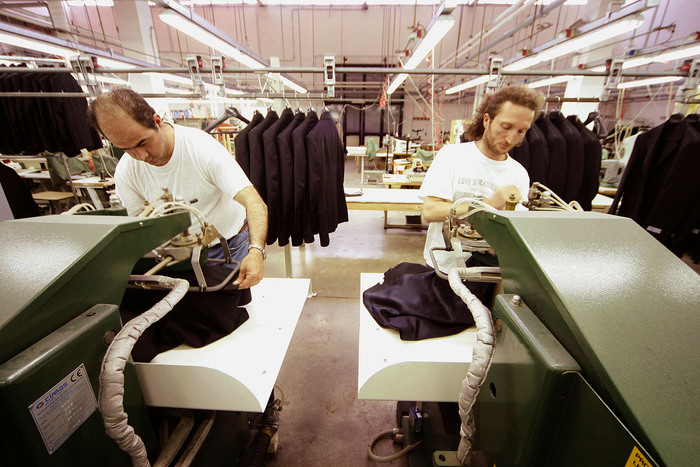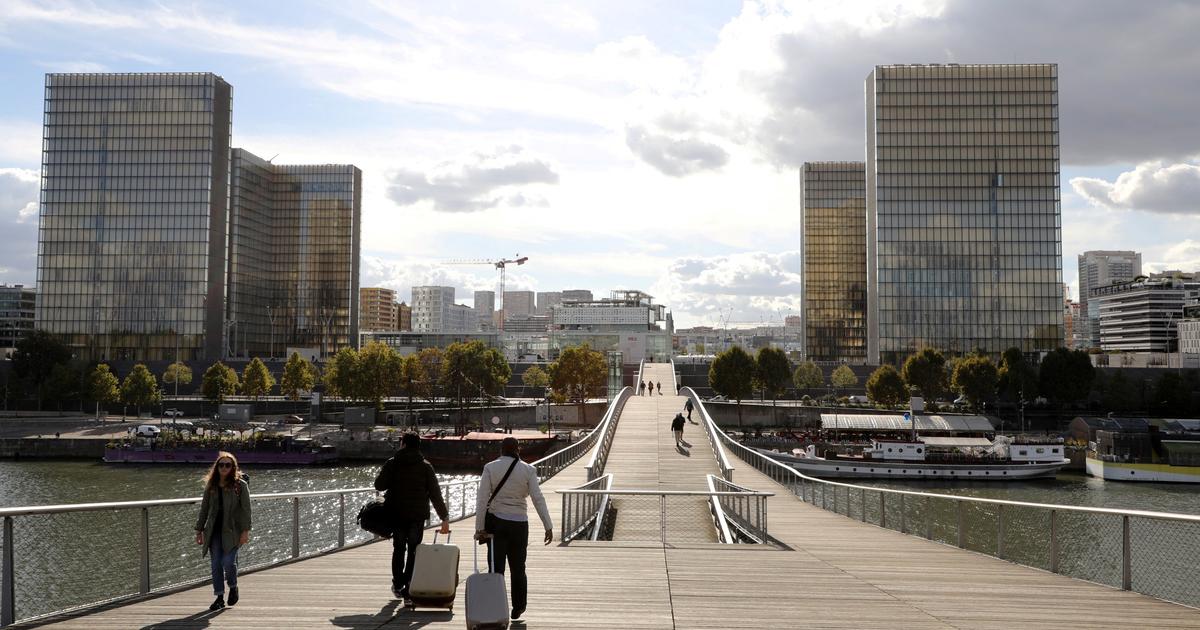It is that hour of the afternoon when at the school gate there should be a great bustle of children going out and parents or grandparents picking them up, but what is at the entrance of the Imakumano school in Kyoto is silence and there is only Hikari Yurugi. She studied there, just like her father, but the baby in her womb won't. Imakumano closed almost a decade ago, because there are fewer and fewer children in Japan, in a demographic collapse of very serious dimensions. So much so that Prime Minister Fumio Kishida said in January that the country is "on the verge of being unable to maintain its social functions." "It's now or never," he said, saying reversing that trend will be his most important policy.
Yurugi is 27 years old. About 1.2 million people were born each year in that Japan of the mid-nineties, which was entering a long phase of economic stagnation after decades of extraordinary growth. In 2022, fewer than 800,000 babies were delivered, with a much faster downward curve than expected until recently and that has unleashed all the alerts.
The government projects that, if the trend is not reversed, it will fall from the current 125 million inhabitants to 100 million around 2050, and to 60 million by the end of the century. The curve is so steep that it calls into question the country's ability to sustain the weight of pensions and assistance to the elderly, to have labor and young people with innovative capacity in sufficient doses to boost the economy.
The Imakumano school is, therefore, a symbol of an extended pattern. The country closes about 500 schools each year. The financial institution Nomura estimates that there are more than 10 million empty properties. Large chunks of Japan are atrophiing.
Birth and aging problems are widespread phenomena in the developed world. Spain and Italy, without going any further, also face similar challenges. But in Japan they are especially acute because they arise in a society with a very strong attachment to traditional values that, among other things, hinder the path towards gender equality or openness to foreigners, important keys to overcoming the crisis. Thus, together with South Korea, it stands out among the countries in greatest difficulty. That conservatism has its political reflection in the almost uninterrupted rule in Japan of the conservative Liberal Democratic Party since 1955.
Contemporary reality challenges postwar Japanese identity in another sense as well: pacifism. The disturbing rise of China, its frictions with Washington or North Korea's rockets demand a shift in its traditional hyper-contained defense policy.
If adaptation to modern times – with climate, technological and other changes – is difficult for everyone, for Japan it represents a profound questioning of identity. Japan remains the world's third largest economic power. It is on its way to becoming a country with significant military capacity in view of the large increase in budgeted defense spending. It is a country endowed with companies of global scope, of high technological potential; It is a safe, orderly, refined society, with admirable quality of life in many ways. All this, however, is threatened, as its prime minister points out, by challenges of existential significance.
It then takes a look at these challenges, the present and the country's perspectives, through the prism of personal history and the points of view of a handful of its young people, the real waning gold of Japanese society. A small portrait of Japan through a mosaic composed of a selection of youthful voices heard in mid-May in Tokyo, Yokohama and Kyoto. Students or workers, with a partner or singles, with children, without, or waiting for one, like Hikari Yurugi who, six months pregnant, in front of the Imakumano school and in a nearby cafeteria, tells her story and because, like many others of her generation, she is skeptical about the possibilities of a profound change in her country.
HIKARI YURUGI
The economic obstacle
Hikari Yurugi, in front of the Imakumano school in Kyoto, where she studied, like her father, and which closed almost a decade ago for lack of children. Andrea Rizzi
Hikari Yurugi walks agilely through the streets of her neighborhood despite the six-month pregnancy and the already very noticeable heat on a May afternoon. In one of the alleys you can see two children of primary school age walking back home from a school further away, with their backpacks in an identical way, a small symbol among many of a society governed by a multitude of canons, structures, norms, hierarchies and very strong traditions. Yurugi wanted to get out of them a little.
After finishing his degree, he started working in a local company, Nissha, specialized in the production of industrial and medical materials, as the canon dictates: find a job after finishing his studies and from there work long hours with few vacations. But he deviated from it. "I was so young, it seemed like a waste to spend so many hours in front of a computer. I wanted to use the body," he says. He went to live in the small Amami archipelago, north of Okinawa.
He was living there for a while, leaving the traditional framework. She worked various jobs, until her mother's cancer disease induced her to return to Kyoto. The mother was able to watch the daughter's wedding last year, but she won't be able to meet the baby in her womb. "Do whatever you like," he told me," Yurugi recalls.
He tried, but his experience recalls the lingering influence of traditional canons and the consequences of departing from them. Now, he works part-time in a company. "When you leave a full-time position, then it's hard to get another one. Maybe I could have done it little by little, but now motherhood is another obstacle," she says.
Japanese society expects the established path to be followed. Those who do not do it to follow their instincts expose themselves to difficulties. The problem is that even following the orthodox path is not very conducive to parenthood, with long working hours, few vacations, traditionally high housing costs for small spaces, and a system with incomplete and unsatisfactory public services for many.
"I think the low birth rate is above all an economic problem. You have to assume significant expenses in education and health, "says Yurugi. A survey by the National Institute of Research on Population and Social Security in 2021 detected that for 53% of respondents that was the main obstacle to having children.
It may come as a surprise that, in a prosperous society like Japan's, the economic component is a major drag on it. The point is that free public education only goes up to the age of 15, and anyway families want private education for their children because it is considered better. Childcare or the health system is not universally covered. Prime Minister Kishida acknowledged that action is needed along these lines, and on Thursday announced his intention to redouble public spending on childcare to bring it up to Sweden's level.
Yurugi deviated from the standard path but does not reject the traditions of his country. However, he has no doubt that the country needs a change of direction.
Is there a need for change in Japan?
-Of course! But I am not confident that it will happen. The leaders are older, and I think they have no interest in big change. The press is not very brave. And it seems to me that young people are surrendered. I vote, but many don't even do that.
HIBIKI SUGII
The growing desire to emigrate
Hibiki Sugii, a 20-year-old university student in Kyoto.Andrea Rizzi
Sugii, 20, was born in Fujieda, a small town between Tokyo and Kyoto, where he moved to study at university. First leap of another bigger one that this smiling young man wants to take: living abroad.
This longing, prevalent in other nations, even prosperous ones, has been much less so in Japan, a traditionally very closed society. Just over half a million Japanese live permanently abroad, 0.4% of the resident population. Another 700,000 were abroad in 2022 in extended stays, exceeding three months. Spain, for example, has about 2.8 million residents abroad, equivalent to 6% of its population. But the number of Japanese who leave grows, and above all it is the young people who march. A potential complication to face the demographic challenge.
"Young people in Japan are not very happy," says Sugii, with direct and clear reasoning that is not the most usual. "Here you don't feel very free to find your own way. We are a bit of a herd. We go with the flow, we act thinking about what others will think. I don't feel very comfortable with that way of thinking. The weight of traditions is a bit stressful. I'm quite motivated to go live abroad," he says.
Jung-Eun Lee, a senior researcher in migration and part-time professor at Ritsumeikan University, says she's seeing a shift in recent years, a greater interest in learning English and going abroad. He also believes that there is a change of values in the new generation. "Some things are changing, but not the structure. It is a society with strong roots in history. They change little things, but they don't dig, they don't touch the foundation."
Sugii, with a passion for making lo-fi hip hop music, manifests ideas that show a clear generational cut. She believes that society should be much more feminist. He is completely comfortable with the idea of increasing Japanese arsenals. "I agree with increasing military spending and having more weapons. Nuclear, no, but normal, yes. I don't want them to be used, but I think it makes sense to make others not have bad ideas and not to depend so much on the United States."
AKIHO KOBOKAYAMA
The maternity-career dilemma
Akiho Kobayakawa, on a street in Tokyo's Ginza neighborhood, adjacent to the headquarters of the company where he works. Gonzalo Robledo
"When I think about my future, I think I'm at a crossroads. I haven't decided anything yet, but I feel like I'm facing the dilemma of my life. The ideal would be to be able to have a career and a family," says Akiho Kobokayama, 32. She was born in Hiroshima Prefecture and moved to Tokyo ten years ago to study. He now works in the capital at the Shinto Tsushin advertising agency.
The rate of women's participation in the labor market has increased in Japan, from 60% at the beginning of the century to 74% today. This is a fact of enormous importance in a country with a shortage of workers.
However, the practical conditions of this positive integration step have shadows, with persistent inequality in management positions, wage gaps. In addition, motherhood still constitutes a brake on career prospects. Problems shared with other advanced democracies, but according to a broad consensus of experts, more accentuated here than in others.
The feeling of dilemma expressed by Kobokayama is undoubtedly one of the elements influencing Japan's demographic decline. "I think, in Japan, compared to before, it's easier for women to work. The difference is when it comes time to get married, to give birth. At that stage, men have more advantages," he says, in a room at his company's headquarters in Tokyo's Ginza neighborhood.
She says that many of her friends from Hiroshima are married and some of them already have children. On the other hand, of her friends from the university of Tokyo, none is married. "I contemplate the option of being happy without marriage and children," he says, in a sign of a clear cultural shift from majority views in past generations.
The place of origin of Kobokayama, Hiroshima Prefecture, a global symbol of nuclear horror, marks his vision of the geopolitical change facing the country. "In Hiroshima we have a relatively strong awareness of the value of peace and nuclear risks. Young people in Tokyo do not have much interest in these issues or in the prospect of a possible change of the Constitution. I think it is necessary to educate more in this type of knowledge. I understand the defense needs. I understand that demographic decline, among other things, is a problem if in the future it is necessary to recruit forces to defend itself. At the same time, I believe that there cannot be only a focus on defense, and that young people must learn more about the meaning of peace and war," he says.
-Are you happy?
-I would like to know what happiness is. But I can say that I feel satisfied. I don't have any big worries.
LAURA PANO
Obstacles to immigration
Laura Pano, a 30-year-old Italian, on a street in Kyoto, where she works for a company in the video game sector. Andrea Rizzi
"As a foreigner, you never feel perfectly integrated," says Laura Pano. A 30-year-old Italian, she lives in Kyoto, where she works for a company in the video game industry. She began to approach the Japanese language and culture in her university years in Italy, and decided to move to the Asian country before the pandemic, magnetized by the many attractive features of Japanese society.
Pano is one of the 2.7 million foreign residents in Japan. They represent just over 2% of the population, a small share compared to the figures of other advanced democracies. The data is a reflection of a society traditionally reluctant to accept immigration, a phenomenon that could be a palliative for demographic decline.
The Japanese government has tried in recent years to relax regulations to attract labor, but always with rigid schemes that have not provided enough progress to compensate. Over the pandemic years, in fact, the number of foreigners has dropped. Language, strong cultural roots, legislation and other factors inhibit the attraction and full integration of foreigners.
"The experience as a student was simple. Difficulties arise when you decide to live here long-term without being married to a local citizen," says Pano. His trajectory in Japan shows the traits of a very organized society, but at the same time very rigid, with norms and customs that can be obstacles for foreigners, from renting a house to fitting into the local work mentality.
Pano believes that there are some signs of evolution in Japanese society, that the position of women in the labor market has improved, that there is more talk of scourges such as sexual harassment. But he thinks the improvement is too slow. "I believe that if it doesn't make a decisive turn and soon, this country will have no future," he says.
SEIKO GAKUIN INSTITUTE
Educating for equality
Students at Seiko Gakuin High School in Yokohama during a class. Andrea Rizzi
In a quiet area of Yokohama, with narrow streets that give the feeling of being in a village, is the Seiko Gakuin Institute. Unlike the Imakuman school, this center is still active decades after its foundation, full of students. It is a private, Catholic institute for boys, in which many students graduate who continue their educational trajectory in the best universities in Japan.
Professor Seiichi Kudo, 68, has been director of the institute for two decades. When he started teaching more than 40 years ago, twice as many children were born in Japan as today and the economy was growing strongly. Generations with very different perspectives have passed before his eyes. The professor points out that, for about two decades, a subject has been consolidated in Japanese educational systems that aims to emphasize the importance of gender equality, of sharing tasks between men and women.
Kudo points out that the Seiko Gakuin pays special attention to this issue. "We consider it important for a school that prides itself on excellence and whose students are going to be part of the future ruling class. Leaders must be aware of the social situation and learn about gender equality, sharing household chores."
It is a symbol of the growing awareness that some courses need to be corrected. Among the interviewees there is consensus that things are changing, but too slowly.
ANNA KUROKAWA
The elusive paternity leave
Anna Kurokawa, with her husband and their daughter, Ari, in Tokyo.Gonzalo Robledo
Anna Kurokawa is 35 years old, a journalist at the private TBS network, and is the mother of Ari, who is one year and two months old. She is currently on maternity leave. Her husband, a producer in the same chain, did not take a day of paternity when the daughter was born. They say he couldn't: with the workload he had, it was impossible.
Kurokawa's story shows how change in Japan needs very decisive action by legislators, because in shadow areas old traditions and work cultures prevail.
Kurokawa and her husband show modern, rather liberal views. They point to what they see as the excessive spirit of competitiveness with which many parents raise their children and which exacerbates the problems by multiplying the resources that must be allocated to their education. However, when asked about reference values to preserve in the future of Japan, they point to "the culture of the good craftsman", a banner of the zeal to always seek perfection with an iron discipline, a very traditional reference.
RIKUTO FUKUDA and YOKO WATANABE
The persistent military taboo
Rikuto Fukuda, 25, in a common room of the residence where he lives, in Kyoto.Andrea Rizzi
There is a collective dinner in the common kitchen of the Oak House residence in Kyoto, a building that offers common services to the residents, among whom the majority are young. They talk about Japan, its identity, the challenges that lie ahead.
Yoko Watanabe, 32, a chef, is very much against the rearmament of her country. He says that his grandfather was a soldier in World War II and never fully recovered mentally from that experience. Rikuto Fukuda, 25, a municipal architect, notes that there is not much talk in society about these issues. Other attendees at the dinner agree. It was taboo for a long time and, according to Fukuda, it is still not dealt with naturally even though it is a momentous issue.
Fukuda says she would like to have children. Watanabe, with five brothers and sisters, would like to have three. Neither of them has children yet.
Yoko Watanabe, 32, in Kyoto.Andrea Rizzi
Kishida, the prime minister, declared that Japan's mission is to create a "children first" economy and is considering multiple measures for them. Japan must hurry up. Births fall so steeply that it threatens the stability of the system. At the moment, what is coming, are many more closed schools such as the Imakumeno in Kyoto, where Hikari Yurugi says goodbye. She is skeptical that her country will be able to change thoroughly. But she does want to have another child. Japan needs more young people in that spirit.
Follow all the international information on Facebook and Twitter, or in our weekly newsletter.
Subscribe to continue reading
Read without limits
Read more
I'm already a subscriber









/cloudfront-eu-central-1.images.arcpublishing.com/prisa/S5LLCLJ6LJB53J6JRHN5FTWCSM.jpg)